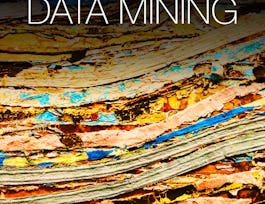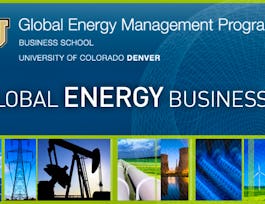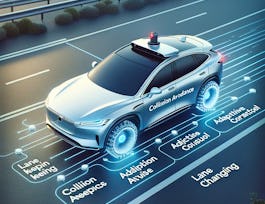This course explores and critically analyzes historical and contemporary climate policies (e.g. Kyoto Protocol and the Paris Agreement). Political issues pertaining to energy sources, such as nuclear energy, will be reviewed. The course will focus on understanding key climate principles and terms surrounding policy development, specifically for low-income or developing countries/communities. Further, this course explores up-to-date technologies that are used in climate analysis.

Give your career the gift of Coursera Plus with $160 off, billed annually. Save today.


Global Climate Change Policies and Analysis
This course is part of Modeling and Predicting Climate Anomalies Specialization

Instructor: Osita Onyejekwe
Included with 
Recommended experience
What you'll learn
Identify climate goals and policies, such as the Kyoto Protocol and the Paris Agreement.
Describe the impacts of climate change.
Evaluate the technological, economic, and policy challenges associated climate change mitigation strategies.
Details to know

Add to your LinkedIn profile
July 2024
2 assignments
See how employees at top companies are mastering in-demand skills

Build your subject-matter expertise
- Learn new concepts from industry experts
- Gain a foundational understanding of a subject or tool
- Develop job-relevant skills with hands-on projects
- Earn a shareable career certificate


Earn a career certificate
Add this credential to your LinkedIn profile, resume, or CV
Share it on social media and in your performance review

There are 4 modules in this course
In this module, you will delve into critical aspects of energy and environmental governance, starting with an exploration of global climate policies and their effectiveness. The focus then shifts to understanding the historical development and contemporary debates surrounding nuclear energy as an alternative to fossil fuels, examining its potential roles and challenges. The module concludes with an exploration of future energy landscapes, emphasizing renewable energy sources and their policy incentives in the United States.
What's included
3 videos8 readings1 assignment2 peer reviews2 discussion prompts
In this module, you will embark on an in-depth exploration of nuclear power, beginning with a foundational understanding of what nuclear power entails. Then, you will explore various perspectives of nuclear power as an alternative energy source before examining nuclear energy policies and technological advancements tailored for the 21st century, analyzing how regulations and innovations shape the nuclear energy landscape globally.
What's included
4 readings1 assignment1 peer review
This module centers on an exploration of climate change and its multifaceted impacts. You will begin by examining the fundamentals of climate change before delving into the intricate relationship between weather patterns and climate change, analyzing how global warming influences regional climates and exacerbates extreme weather events. The discussion then shifts to the phenomena of El Niño and La Niña, exploring their roles in altering weather patterns globally and their implications for climate variability. You will also investigate the alarming trend of mountain glacier recession, studying the environmental, social, and hydrological ramifications of diminishing glaciers worldwide.
What's included
8 readings1 peer review2 discussion prompts
In this final module, you will explore future emission scenarios and mitigation strategies crucial for addressing climate change. First, you will examine emission scenarios, discussing how different projections influence climate models and policy decisions, and Representative Concentration Pathways (RCPs), analyzing these pathways as frameworks for quantifying greenhouse gas concentrations and their impacts on global climate. Then you will explore carbon capture and storage (CCS) technologies, focusing on their role in mitigating emissions by capturing CO2 from industrial processes and storing it underground.
What's included
4 readings2 peer reviews
Instructor

Offered by
Recommended if you're interested in Environmental Science and Sustainability

University of Colorado Boulder

University of Colorado System

University of Colorado Boulder

University of Colorado Boulder
Build toward a degree
This course is part of the following degree program(s) offered by University of Colorado Boulder. If you are admitted and enroll, your completed coursework may count toward your degree learning and your progress can transfer with you.¹
Why people choose Coursera for their career





Open new doors with Coursera Plus
Unlimited access to 7,000+ world-class courses, hands-on projects, and job-ready certificate programs - all included in your subscription
Advance your career with an online degree
Earn a degree from world-class universities - 100% online
Join over 3,400 global companies that choose Coursera for Business
Upskill your employees to excel in the digital economy
Frequently asked questions
Access to lectures and assignments depends on your type of enrollment. If you take a course in audit mode, you will be able to see most course materials for free. To access graded assignments and to earn a Certificate, you will need to purchase the Certificate experience, during or after your audit. If you don't see the audit option:
The course may not offer an audit option. You can try a Free Trial instead, or apply for Financial Aid.
The course may offer 'Full Course, No Certificate' instead. This option lets you see all course materials, submit required assessments, and get a final grade. This also means that you will not be able to purchase a Certificate experience.
When you enroll in the course, you get access to all of the courses in the Specialization, and you earn a certificate when you complete the work. Your electronic Certificate will be added to your Accomplishments page - from there, you can print your Certificate or add it to your LinkedIn profile. If you only want to read and view the course content, you can audit the course for free.
If you subscribed, you get a 7-day free trial during which you can cancel at no penalty. After that, we don’t give refunds, but you can cancel your subscription at any time. See our full refund policy.

